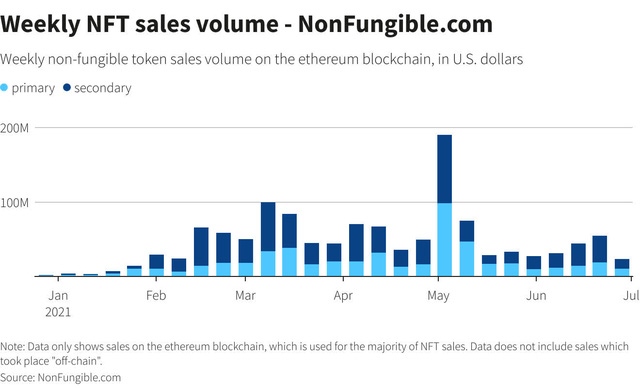What does Vietnam need to do to develop the NFT market – the digital asset that makes the world ‘crazy’ more than bitcoin?
- Tram Ho
Relevance of NFT and digital transformation
The Oxford Digital Economy Collaborative Group defines: “Digital economy is an economy that operates on the basis of digital technology, especially electronic transactions conducted through the Internet”.
Accordingly, many experts have pointed out three outstanding advantages of the digital economy, including: growth of e-commerce, promoting Internet users, as well as developing a system of digital economic goods and services. . In addition, the digital economy also ensures transparency, helping managers control the economy better.
With NFT, investors can be assured of 3 characteristics: uniqueness, non-exchangeability, and rarity. Accordingly, each NFT token is generated with a unique identifier, which cannot be directly swapped with other tokens. Therefore, this can be considered as the missing piece of the digital economy, helping investors to prove ownership easily and without being manipulated.

Photo: Forbes
2 benefits of NFT to the economy
First , NFT helps maximize income for creators, ensuring ownership. Around the world, NFT is being used commonly in digital content with music, art, and pictures.
NFT powers the creator economy, where creators don’t transfer ownership of their content to the platform they use to make it public. When a creator or owner sells their content, the money goes directly to them.
What’s more, if the new owner later sells the NFT, the original creator can automatically receive royalties. This is not possible with today’s traditional way of securing intellectual property.
Second , NFT helps to encode physical products, expanding the market for buying and selling. Many projects have been researching the coding of real estate, fashion products, and antique editions of great value.
When large value assets such as houses, apartments, and land are tokenized into small “templates”, or NFTs, owning this token means you own a part of it. . As a result, liquidity will be more vibrant, market objects will also expand almost without borders within countries and territories, but without borders, providing higher profit opportunities for individuals. owners in particular and for the digital economic ecosystem in general.
Vietnam can’t be left out
In the context of the Covid-19 epidemic worldwide, many countries have increased the use of contactless technology. This is part of the reason why individuals and organizations enter the NFT market every day. One of the examples in Vietnam is a digital platform for the real estate market called ANFT.
Experts believe this space will quickly turn into a multibillion-dollar industry, and expand beyond art and music ownership.

Reaching $2.5 billion in revenue in the first half of 2021, NFT is forecasted to continue to grow in the remaining months. Source: Market Screener
Currently, Vietnam is not out of the race in developing the digital economy. In August, the Prime Minister assigned the Ministry of Information and Communications to lead the development of the National Strategy on development of the digital economy and digital society.
Vietnam currently has a group of law researchers studying the legality of virtual currencies. Accordingly, the researchers point out the need for a clear definition of virtual currency. If you want to build a legal framework for this product, you need to have a clear definition first.
Second, the research team proposes to recognize virtual currency as a new type of asset, specifically: “In the coming time, Vietnam needs to recognize virtual currency as a new type of property in the Civil Code – property The concept of property in Article 105 of the Civil Code 2015 needs to be amended in the direction of adding “other types of assets prescribed by law”.
In addition, determining the legal status of virtual currencies will be a solid basis for the process of developing regulations on other related issues such as: management of ICO activities, exchanges, taxes on with virtual currency…
Source : Genk
